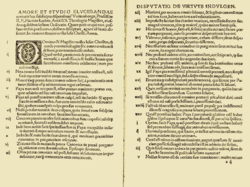
Back Duitse Boereoorlog Afrikaans Bauernkrieg ALS حرب الفلاحين الألمانية Arabic Almaniya kəndli müharibəsi Azerbaijani Сялянская вайна ў Германіі Byelorussian Селска война Bulgarian Guerra dels camperols Catalan Německá selská válka Czech Германири Хĕресчен вăрçи CV Den tyske bondekrig Danish
| German Peasants' War | |||||||
|---|---|---|---|---|---|---|---|
| Part of the European wars of religion and the Protestant Reformation | |||||||
 Map showing the locations of the peasant uprisings and major battles | |||||||
| |||||||
| Belligerents | |||||||
| Peasants' army | |||||||
| Commanders and leaders | |||||||
| Strength | |||||||
| 300,000 | 6,000–8,500 | ||||||
| Casualties and losses | |||||||
| >100,000 | Minimal | ||||||
| Part of a series on the |
| Reformation |
|---|
 |
| Protestantism |
| Part of a series on |
| Anabaptism |
|---|
 |
|
|
The German Peasants' War, Great Peasants' War or Great Peasants' Revolt (German: Deutscher Bauernkrieg) was a widespread popular revolt in some German-speaking areas in Central Europe from 1524 to 1525. It was Europe's largest and most widespread popular uprising before the French Revolution of 1789. The revolt failed because of intense opposition from the aristocracy, who slaughtered up to 100,000 of the 300,000 poorly armed peasants and farmers.[1] The survivors were fined and achieved few, if any, of their goals. Like the preceding Bundschuh movement and the Hussite Wars, the war consisted of a series of both economic and religious revolts involving peasants and farmers, sometimes supported by radical clergy like Thomas Müntzer.[2] The fighting was at its height in the middle of 1525.
The war began with separate insurrections, beginning in the southwestern part of what is now Germany and Alsace, and spread in subsequent insurrections to the central and eastern areas of Germany and present-day Austria.[3] After the uprising in Germany was suppressed, it flared up briefly in several Swiss cantons.
In mounting their insurrection, peasants faced insurmountable obstacles. The democratic nature of their movement left them without a command structure and they lacked artillery and cavalry. Most of them had little, if any, military experience. Their opposition had experienced military leaders, well-equipped and disciplined armies, and ample funding.
The revolt incorporated some principles and rhetoric from the emerging Protestant Reformation, through which the peasants sought influence and freedom. Some Radical Reformers, most famously Thomas Müntzer, instigated and supported the revolt. In contrast, Martin Luther and other Magisterial Reformers condemned it and sided with the aristocrats. In Against the Murderous, Thieving Hordes of Peasants, Luther condemned the violence as the devil's work and called for the aristocrats to put down the rebels like mad dogs.[4] The movement was also supported by Huldrych Zwingli, but the condemnation by Luther contributed to its defeat.[5] While around 20 veterans of the war went on to become leading figures in the Anabaptist movement, James Stayer notes that "no large number of known Anabaptists can be identified by name as participants in the 1525 upheaveal".[6][7]
- ^ Blickle 1981, p. 165.
- ^ "Thomas Muntzer | Biography, Theology, Writings, Death, & Facts". Britannica. Retrieved 11 February 2023.
- ^ Klassen 1979, p. 59.
- ^ Jaroslav J. Pelikan, Hilton C. Oswald, Luther's Works, 55 vols. (St. Louis and Philadelphia: Concordia Pub. House and Fortress Press, 1955–1986), 46: 50–51.
- ^ "Peasants' War | German history | Britannica". www.britannica.com. Retrieved 31 March 2022.
- ^ "Book Review:The German Peasants' War and Anabaptist Community of Goods. James M. Stayer".
- ^ Stayer, James (1991). The German Peasants' War and Anabaptist Community of Goods. Montreal: McGill-Queen's University Press. p. 61. ISBN 9780773511828.